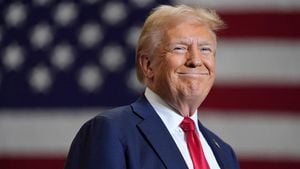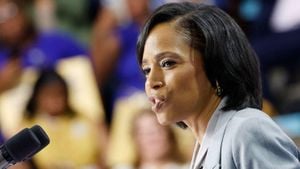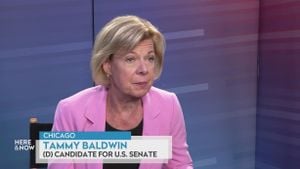Donald Trump’s shocking victory in the recent U.S. elections has sent waves of uncertainty rippling through Ukraine, a country still grappling with the aftermath of Russia’s aggressive invasion. For Ukrainian leaders, the win has stirred up both worry and hope as they ponder the future of American support for their fight against Russian aggression. The complex dynamics of Trump's foreign policy intentions—along with his history of controversial statements about Ukraine and Russia—bring unpredictable challenges to the forefront.
When Trump declared he would resolve the Ukraine crisis "in 24 hours" if re-elected, it immediately raised eyebrows. Critically, he didn’t detail how he would achieve this momentous feat, leading many to question whether it was more of a campaign soundbite than a substantial policy plan. Trump's past has shown he often favors direct negotiations, hinting at potentially favorable terms for Moscow—a factor many observers fear could undermine Ukraine’s hard-won gains.
Ukraine’s President Volodymyr Zelenskyy was quick to contact Trump following his election, reportedly discussing strategies to counter Russian of aggression, but the atmosphere remains tense. Zelenskyy's emphasis on "strong and unwavering U.S. leadership" reveals the underlying anxiety about what Trump's presidency could mean for military aid—aid which has proven pivotal since the onset of full-scale war in 2022.
Now, as Biden's administration gears up to expedite billions worth of security assistance to Ukraine—aimed at reinforcing Kyiv's position before Trump officially takes office—questions loom about how long this aid might continue under Trump. Trump has openly criticized the scale of U.S. military aid to Ukraine, which has climbed to over $64.1 billion since the invasion, and hinted at potential cuts, leading to fears about the sustainability of Ukraine’s resistance.
Beyond his past comments, sentiments within Ukraine concerning Trump are mixed. Soldiers manning the front lines express anxiety about the incoming administration’s direction but cling to what hope remains. Many are voicing their thoughts, reflecting their willingness for continued assistance regardless of who occupies the U.S. White House. For example, one artillery commander said they only hope the support volume will increase—an indication of their desperate need for resources against advancing Russian forces.
Understanding attitudes on the ground, one drone unit commander sported an American flag on his uniform, appreciating U.S. involvement but recognizing the potentially detrimental shift Trump’s presidency could engender. He articulated the delicate balance between relying on American support and the fears of being perceived as nags for funds. This sentiment captures the duality of Ukrainian perspectives—strong gratitude intermingled with deep concern over the future.
The unpredictability surrounding Trump's foreign policy emerges as both potential leverage and danger. Some analysts argue this could mean he's less likely to pressure Ukraine toward unfavorable agreements, as he may wish to avoid any stigma of weakness or failure. Trump's reputation is starkly interwoven with public perception—an inherent motivator as he undertakes potentially sensitive negotiations with Russia.
Historical relations demonstrate the volatile environment surrounding U.S.-Ukraine relations. Under Trump's previous administration, arms were first sent to Ukraine with Javelin anti-tank missiles, pivotal to Ukraine's early defenses. Yet his tendency to praise Putin coupled with skepticism about foreign military involvement creates doubt about long-term U.S. commitment to Ukrainian sovereignty. He has been known to suggest peace might entail territorial concessions, pushing back against the potential for escalation.
Experts stress the importance for Ukrainian military and political leaders to remain vigilant as Trump's presidency inches closer. Former NATO chief Anders Fogh Rasmussen expressed belief Trump’s appreciation for winning could be advantageous, cautioning against any insistence from the U.S. side to push Ukraine toward unfavorable negotiations.
Meanwhile, as Russian forces continue to engage Ukrainian positions, there exists uncertainty on how they might interpret U.S. elections. The Kremlin’s response indicated eagerness as relations slip to unprecedented lows under Biden—with many analysts believing Trump's election might signal opportunities for Moscow to recalibrate its military planning based on shifting alliances and rhetoric.
Critically, Ukrainians are bracing for the stark reality of dealing with what could be termed the “Trump reality.” This new chapter could bring advantages alongside challenges, and the outcomes remain closely tied to what Trump proposes and negotiates. The idea of “peace through strength” emerges as Zelenskyy contemplates its viability under Trump, once again leaning on the notion of fostering strong alliances and adequate military support.
The focus now shifts to the Biden administration's final months, where emphasis on providing Ukraine with long-range weapons and leveraging NATO membership could be leveraged to strengthen Ukraine's position before Trump officially takes office. Kurt Volker, former U.S. special representative for Ukraine negotiations, indicated the importance of maintaining strong military aid and broadening tactical support until Trump's agenda becomes clearer.
Overall, the level of anxiety and hope present juxtaposes sharply within Kyiv. While core Ukrainian fighters express commitment to resist against overwhelming odds regardless of leadership, broader sentiments echo concerns about shifting policies and future uncertainties. It signals the complexity of democracy, foreign relations, and the endurance of nations facing existential threats—all resting perilously on the whims of leadership far beyond their borders.



